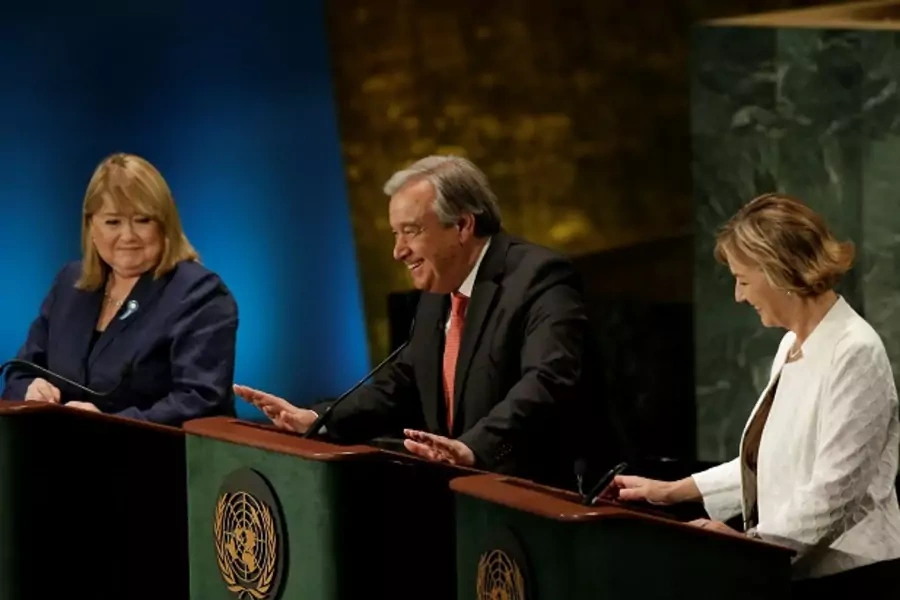More on:
Welcome to “Women Around the World: This Week,” a series that highlights noteworthy news related to women and U.S. foreign policy. This week’s post, covering from October 2 to October 8, was compiled with support from Becky Allen, Anne Connell, and Lauren Hoffman.
Women’s leadership at the United Nations
The United Nations (UN) Security Council formally agreed this week that Antonio Guterres should succeed outgoing Secretary-General Ban Ki-moon, after the final straw poll of the year-long appointment process revealed that no council member would veto the choice. A former prime minister of Portugal, Guterres also led the UN’s refugee agency for ten years, making him a highly-qualified and timely choice in light of the ongoing migration crisis. The race for the next secretary-general, however, also highlighted the challenges women face in breaking into the upper echelons of political leadership at the UN. Earlier in the year, there was widespread anticipation that the Security Council would put a woman in the world’s top diplomatic post for the first time in the UN’s seventy-one year history. Seven women were among the thirteen candidates vying for the position, including Irina Bokova, director-general of UNESCO, Susana Malcorra, foreign minister of Argentina, and Helen Clark, former prime minister of New Zealand and administrator of UNDP. But none of the female candidates were ever seriously considered, as indicated by the straw polls. Despite the UN’s commitment to gender parity in managerial and decision-making roles—a pledge made twenty years ago—only 22 percent of UN leadership positions were held by women in 2015.
Safety measures for refugee women and girls
The German government, in partnership with UNICEF and the German Red Cross, launched a pilot program to improve safety for women and children in twenty-five refugee shelters across the country. The effort is spearheaded by Germany’s Minister of Family Affairs Manuela Schwesig, and took shape in light of reports of high levels of assault, exploitation, and trafficking of vulnerable groups—particularly women and children—among the more than one million asylum-seekers who have arrived in the country over the past two years. Only this year has UNICEF placed a coordinator in Germany to advise federal and state governments on children’s protection. Under the new initiative, social workers who are trained to identity abuse within the shelter offer counseling services to all women and children. And unlike in the vast majority of other camps and shelters in Germany—as well as across Europe and the Middle East—all accommodations in the pilot program have sex-segregated spaces, private bathrooms, and locking doors. Research has shown that these relatively simple, low-cost interventions can significantly reduce levels of violence and sexual assault—and many German officials hope the program can be brought to scale across the country.
Women’s political leadership in Liberia
Following a series of UN Women-supported consultations and public hearings held since 2009, the Liberian House of Representatives passed the landmark Equal Representation and Participation Act last week. The act, unprecedented in Liberia’s history, establishes five reserved seats for women in the country’s lower house of parliament. While Liberia elected President Ellen Johnson Sirleaf in 2006, making her the first female head of state in Africa, the nation ranks amongst the lowest on the continent—fortieth out of fifty-four measured countries—in terms of women’s representation in parliament. In fact, according to the Interparliamentary Union, as of August, women only held 11 percent of parliamentary seats in Liberia’s lower house of parliament, in contrast to nearly 64 percent in Rwanda’s lower house (consistently one of the world’s highest ratios) and 43 percent in Senegal’s single house parliament. With Liberia’s 2017 presidential and legislative elections approaching, the act lays the groundwork for a new era of increased women’s political participation and leadership, which evidence suggests will contribute to the sustainability of the country’s thirteen years of peace post-civil war.
More on:
 Online Store
Online Store
